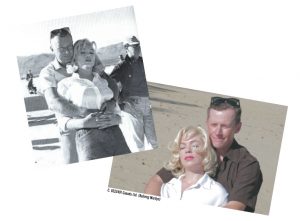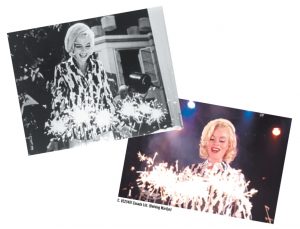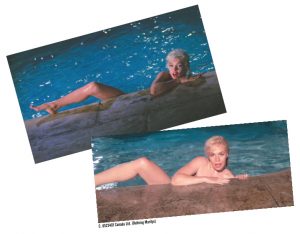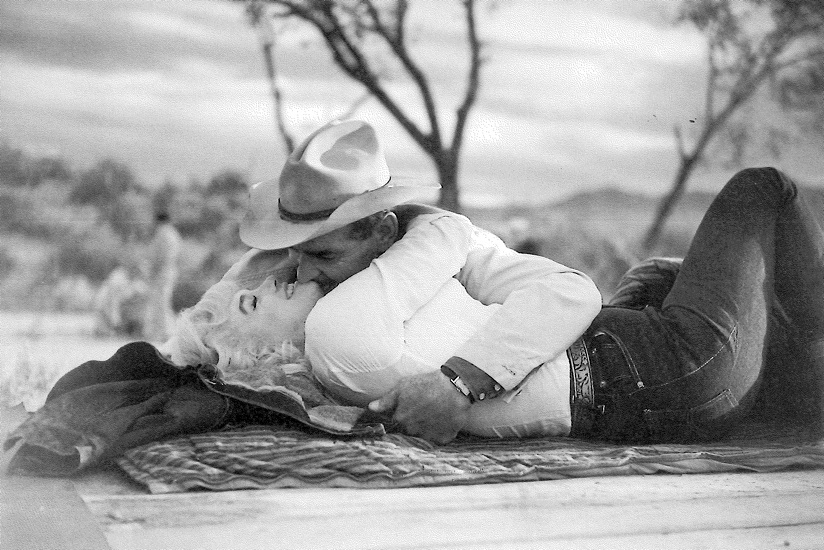The upcoming film, Reliving Marilyn, focuses on Marilyn’s close friendship with her makeup artist, Whitey Snyder. Actor and co-director of the film, Morgan Blackbyrne, answered a few questions about it for Immortal Marilyn. He co-stars as Whitey with his wife, Nadine Banville, both IM members.
How did the idea for Reliving Marilyn come about?
 One day, while Nadine and I were discussing our discoveries about Marilyn (through much reading and research), I had a thought as an actor/film maker – When I saw the photo of Marilyn’s body being wheeled out of her last home by a ambulance attendant, I wondered: “What were the thoughts of that guy?!” “What it must have been for him to do his job, that night…”
One day, while Nadine and I were discussing our discoveries about Marilyn (through much reading and research), I had a thought as an actor/film maker – When I saw the photo of Marilyn’s body being wheeled out of her last home by a ambulance attendant, I wondered: “What were the thoughts of that guy?!” “What it must have been for him to do his job, that night…”
I then had the notion of possibly making a film about someone we don’t hear about – an average person in direct contact with Marilyn, if even for a few moments, because that sort of thing interests me a great deal. Sure, there are the big players in the life of someone like Our Girl, but what about the myriad of others we never, or rarely, hear about? It’s this kind of microscope I like to use in my medium of story telling.
It was then that Nadine told me of Whitey and the promise between Marilyn and him. I was totally taken aback! This was a lovely and a true story!
We immediately began work on the script for what was first titled, While I’m Still Warm, later dubbed Reliving Marilyn.
The movie focuses on Marilyn’s relationship with makeup artist Whitey Snyder. What is it about that friendship that made you want to explore it on film?
At first and simply put – because it’s never been done. There has been far too much done about Marilyn’s romantic experiences, real and imagined/exaggerated, that we felt it was refreshing to consider a true story focussed on this non-romantic relationship – this deep friendship that quite permeated Marilyn’s life and yet, so few people know about. Also, from the standpoint of modern film, wherein romance is far too often the go-to formula, I find it generally refreshing to tell stories differently. Stories with soul. True stories. These are things I feel are what discerning viewers are hungry for.
The more we delved into the relationship between Whitey and Marilyn, the more I felt myself on the edge of tears – my heart pulled in this direction. We’ve heard so much about her struggles and, quite truthfully, how she was used by the studio system. To discover this man who was always there for her, right to the end, warmed my soul.
We’ve all felt, in our own ways, the tragedy that imbued Marilyn’s life. So, to discover Whitey was like discovering a light in her life. Certainly not the only light, by any means but, dare I say, possibly the “purest” one? While he was an employee of Marilyn’s, paid for his services, he was a true friend…the kind of friend that seemed in short supply in Marilyn’s life.
And for me, as a person – as an actor – he became my new hero in her life.
Whitey Snyder was known for being fairly quiet on the subject of Marilyn after her death, a loyal friend. Did you find it difficult to get a sense of who he was given mainly second-hand information, and how accurate do you think your portrayal of their friendship is as a result?
 I watched the few interviews with Whitey and soaked up all the written references I could find about him and his relationship with Marilyn. This was greatly augmented by new information discovered by Gary Vitacco-Robles.
I watched the few interviews with Whitey and soaked up all the written references I could find about him and his relationship with Marilyn. This was greatly augmented by new information discovered by Gary Vitacco-Robles.
I don’t wish to spoil the film, but after reading (and loving) our script, Gary suggested two episodes for our film that we hadn’t found in any other reference material! Of course, we then read his books and found his style to be honest, truthful and faithful to Marilyn. Indeed, faithful to the facts. And the true stories are far more interesting than anything some screenwriter could concoct to “make it more juicy”.
Portraying Whitey was my biggest acting challenge to date. His presence was the kind that was strong yet understated at the same time. His sensitivity to Marilyn and her needs was great, and at the same time he had a spine of steel. To me, the ultimate “strong quiet type”. He was direct and honest. Told it like he saw it, and yet was a true craftsman and artist. After all, he helped create Marilyn’s unique look. To this day, make up artists study the make up secrets of Allen Whitey Snyder!
As an actor, I’m a very sensitive person and I spent hours studying and ruminating upon many photos of Whitey with Marilyn. He was a very expressive man, without being overtly so. And in the process of becoming quiet within myself, I feel I discovered more about the man.
While this may seem odd to any non-actors reading this, every performer’s way into a character is an individual journey. You explore all avenues at your disposal and you make choices at the same time accepting immutable facts.
I always go back to two photos in particular – the one where he’s holding the mirror for Marilyn, on the set of Niagara, and the one where’s he’s hugging her in the Nevada desert, on the set of The Misfits.
In the first, I saw such warmth, admiration and hopeful concern, all at once, in his eyes as he held that mirror. I knew I was seeing Marilyn’s protector as well. Someone who would do all he could to help her, serve her, and protect her.
In the Misfits photo (obviously by this point, they both had had many experiences together) I saw the same caring protector and friend, who was by now also quite seasoned at knowing what Marilyn needed.
As most know, The Misfits was a hard shoot for Marilyn, one that Whitey is quoted as saying “…should not have happened” (from the standpoint that he could see she wasn’t ready or well enough to tackle this film yet). And yet, she’s stellar in it!
But Whitey’s caring for Marilyn comes through in that hug photo.
This is where careful and judicious use of artistic license comes into play. Remaining true to the facts as we know them, I wondered what was being said, while all these photos were taken. What were the feelings? What was shared? This guided my screen writing.
I do hope the truest Marilyn fans will accept that in film, there is the need for story telling clarity. What can be effectively dramatized doesn’t have to be vastly (or incorrectly) portrayed, but there are often slight variances from the verbatim truth.
For example, director Ron Howard spoke of this, with regards to making Apollo 13. Apparently, the astronauts never said, “Huston, we have a problem”, but the actual words were reconfigured to fit into this concise and dramatic quote.
Reliving Marilyn has similar, or dialogue extrapolated from accurate accounts of the facts on various sets, Marilyn’s status via chronology, and what we know of her concerns about her work as an actress and person.
This is also where my craft as an actor comes into play. No one can ever totally become another person! And an actor can only be themselves AS the character they’re playing. Both Nadine Banville and I feel this way about our portrayals.
What can Marilyn’s fans expect from Reliving Marilyn that really makes it different from previous biopics?
Reliving Marilyn is a grass roots, professional independent film made by Marilyn FANS! This is a first, as far as I’m aware of. And while we are low budget, our production value is quite the opposite.
Reliving Marilyn is also unique in that we are not basing our film upon the work of one writer but several. You name it, we’ve read it and either employed it or not. We also did our very best to remain true to the facts, having asked the following people to vet our script: Marijane Gray, Mary Sims, and Gary Vitacco-Robles.
I would add that although everyone has a different way of appreciating anything – some are mainly into the factual while others are more concerned about the respect and spirit with which something is handled – we are confident that at very least, we have achieved far better than most other biopics about Marilyn have in the past. Our strength is in the respect for Marilyn and in the spirit with which we made this film; the latter includes being as factually correct as possible. And it seems our consultants agree.
You made an effort to be accurate with this film. How challenging did you find that given the incredible amount of misinformation out there? Do you feel you were successful?
As I began to state in the previous question, yes, we feel we’ve been successful, by and large. We didn’t just read and go. We consulted others as well as vetted our script. I should also point out that there were a few deliberate changes made mainly to avoid infringing upon copyrights! The precise positioning of Whitey and Marilyn in scenes inspired by photo moments are different yet recognizable – If you take a look, you’ll see there’s something different in each of the examples with this article.
I should also point out that, in my mind at least, working with scenes often inspired by photos, lends a greater deal of truth to the story. After all, the photos are factual evidence of, at very least, that these characters did these things and in these places. What was said can only be wondered…but our scenes were created on the basis of facts, not pure conjecture.
Which scene did you have the most fun filming? Which one was the hardest?
 For Nadine, she had the most fun shooting the SGTG pool scene. She’s a natural water baby and loved the freedom of this scene, as much as I feel Marilyn did, as well, despite being unwell during that shoot.
For Nadine, she had the most fun shooting the SGTG pool scene. She’s a natural water baby and loved the freedom of this scene, as much as I feel Marilyn did, as well, despite being unwell during that shoot.
For myself, “fun” isn’t the best word but rather “warm” – our scene inspired by The Misfits hug photo, between Whitey and Marilyn. It embodies virtually most of what their relationship was all about in spirit. For me, at least, this scene was a pleasure to shoot. We kept it simple yet effective.
There’s another scene I loved filming, too, but I won’t mention it lest I spoil the film.
For Nadine, the hardest part was mastering the “Marilyn sound”. We knew we didn’t want to channel Lorelei Lee for every single word that came out of her mouth – this, we feel, has been done too much and is part of the problem with other biopics – they base their take on Marilyn too much on her screen personas, not the real person.
Nadine went with just a touch of Lorelei Lee combined with the much more realistic sound of Marilyn, in the Richard Meryman interview. Nadine also captures Marilyn’s unique laugh, something so tricky that no one we’re aware of has ever quite done it, even a bit.
For me, the hardest thing to do was actually more about balancing the act of being the male lead and co-directing.
I was in charge of the overall visual direction of the film while my co-director, Shannon Lawson, handled most of the actors, including myself. She made sure I changed hats from director/producer to actor.
Actresses who have played Marilyn on film in the past have been subject to a great deal of scrutiny. What are you hoping fans will see in Nadine’s performance that will make it stand out and pass the “fan test”?
Realizing that no one – NO ONE – can ever totally embody another person, we feel that for anyone to expect that there’ll ever be another actress who can TOTALLY capture and portray Marilyn will only lead to disappointment. There is only one Marilyn!
Having said that, we hope people will feel Marilyn’s more tender aspects, in Nadine’s performance. Marilyn’s softness and her so-called “woman-child” quality, Marilyn’s ability to turn on her persona at will and, most importantly in our eyes, Marilyn’s vulnerability and insecurities. These are aspects of Marilyn we feel have been either left out or only given peripheral treatment in most all previous biopics made about her.
What do you most hope viewers of the film will take away from it?
As I see it, this question refers to ALL viewers, Marilyn experts and the general public alike.
For the Marilyn fans and experts, we hope they will both see and feel the respect for Marilyn and the true spirit with which we have made Reliving Marilyn. We hope they love it! At very least, that Reliving Marilyn is the first to stick to the facts rather than sensationalism-to-sell-tickets.
For the average viewer, we hope to open their eyes to more about the real Marilyn, the human being behind the lovely blue eyes and the skirt flying up over a subway grate. And, perhaps, urge them onto their own path of discovering Marilyn, as we all have.
In both cases, we feel all viewers will see that Reliving Marilyn is a unique biopic that respects and honors Marilyn, and the unsung hero of her life – Whitey.
In conclusion, we wish people to know that the fate of Reliving Marilyn being properly distributed is in doubt. Hence our funding drive. We are independent producers, who have made this film for far less than just the legal fees alone on a major Hollywood production. We have had to bootstrap this production from the get-go, especially after our chief financier tragically passed away at age 48, in early 2014. We have struggled ever since, choosing to make this film now or never.
While we respect that we cannot openly post about our funding drive on Immortal Marilyn, we hope that anyone who is keen to help us will contact us via our Facebook page, or directly to me, Morgan Blackbyrne.






